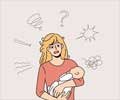How can new moms distinguish between baby blues and postpartum depression? Identify symptoms, manage stress, and seek help for persistent sadness.
- Baby blues are short-term mood swings that improve within two weeks
- Postpartum depression is more severe and requires professional help if symptoms persist
- Self-care, support networks, and early intervention are crucial for new mothers' mental health
Impact of Hormones and Sleep Deprivation on New Mothers
After giving birth, significant hormonal changes occur in a woman’s body. The sudden drop in hormone levels can directly impact mood. Additionally, newborns require round-the-clock care, often disrupting the mother’s sleep schedule. This lack of sleep can further contribute to irritability and emotional distress.The stress of caring for a newborn can be overwhelming. Many mothers worry about their ability to provide adequate care for their baby, leading to feelings of anxiety and stress they may not have encountered before.
Postpartum Blues
Go to source).
Recognizing the Baby Blues
The baby blues typically begin when the newborn is just 2 or 3 days old. Fortunately, these feelings usually improve within one to two weeks. Symptoms of the baby blues include (2✔ ✔Trusted SourcePostpartum depression
Go to source):
- Rapid mood swings from happiness to sadness
- Feeling overwhelmed and anxious
- Lack of appetite or interest in self-care due to exhaustion
- Irritability
Identifying Postpartum Depression
If feelings of sadness persist beyond two weeks or worsen, it could indicate postpartum depression. This condition is more severe than the baby blues and lasts longer. Approximately 10% of new mothers experience postpartum depression. Factors such as a personal or family history of depression can increase the likelihood of developing this condition (3✔ ✔Trusted SourceA Comprehensive Review on Postpartum Depression
Go to source).
Symptoms of postpartum depression include (4✔ ✔Trusted Source
Postpartum mood disorders
Go to source):
- Persistent feelings of hopelessness, sadness, worthlessness, or loneliness
- Frequent crying spells
- Feeling inadequate as a new mother
- Difficulty bonding with the baby
- Inability to eat, sleep, or care for the baby due to overwhelming despair
- Anxiety and panic attacks
Distinguishing Between Baby Blues and Postpartum Depression
To determine whether you’re experiencing baby blues or postpartum depression, consider the duration and intensity of your symptoms. The baby blues involve milder, short-term emotional fluctuations, whereas postpartum depression involves more severe, long-lasting feelings of despair and inadequacy (5✔ ✔Trusted SourceThe Effect of Cold Showering on Health and Work: A Randomized Controlled Trial
Go to source).
Treating the Baby Blues
If you’re experiencing the baby blues, focusing on self-care can help you start feeling better (6✔ ✔Trusted SourcePharmacotherapy of Postpartum Depression: Current Approaches and Novel Drug Development
Go to source). Here are some tips:
Prioritize Sleep:
Rest whenever your baby naps to catch up on much-needed sleep.Eat Healthily:
Nourish your body with nutritious foods to maintain your energy levels and mood.Exercise and Fresh Air:
Take walks to benefit from exercise, fresh air, and sunlight, which can boost your mood.Accept Help:
Don’t hesitate to accept help from family and friends.Relax and Focus on You and Your Baby:
Set aside chores and concentrate on bonding with your newborn.
Treatment Postpartum Depression
If your symptoms of sadness and despair persist beyond two weeks or intensify, it’s crucial to seek professional help. Don’t wait until your 6-week postpartum checkup to address these feelings. Early intervention can make a significant difference in your recovery.Your doctor might recommend counseling or prescribe antidepressants to help manage your symptoms. One of the newer treatments available is brexanolone (Zulresso), a synthetic version of the hormone allopregnanolone, which has shown effectiveness in alleviating postpartum depression symptoms.
Talking about your feelings is vital. You might hesitate to share your emotions, fearing judgment or misunderstanding. However, discussing your struggles with a healthcare professional, family member, or trusted friend can provide the support you need.
Surrounding yourself with a strong support network is beneficial. Engage with other new mothers, either in person or through online communities, to share experiences and advice. Knowing that others are going through similar challenges can provide comfort and reassurance.
Promoting Mental Well-being During the Postpartum Period
To maintain your mental well-being during this challenging period, consider incorporating the following practices into your routine:Mindfulness and Relaxation Techniques:
Practices such as meditation, deep breathing exercises, and yoga can help manage stress and anxiety.Journaling:
Writing down your thoughts and feelings can be therapeutic and provide insight into your emotional state.Set Realistic Expectations:
Understand that it’s okay not to have everything under control. Parenting is a learning process, and it’s normal to make mistakes.
When to Seek Professional Help
It’s important to recognize when self-care measures are insufficient. If you experience any of the following, contact your healthcare provider immediately:- Persistent feelings of hopelessness or worthlessness
- Inability to care for yourself or your baby
- Thoughts of self-harm or harming your baby
References:
- Postpartum Blues - (https://pubmed.ncbi.nlm.nih.gov/32119433/)
- Postpartum depression - (https://pubmed.ncbi.nlm.nih.gov/19318144/)
- A Comprehensive Review on Postpartum Depression - (https://pubmed.ncbi.nlm.nih.gov/36686097/)
- Postpartum mood disorders - (https://pubmed.ncbi.nlm.nih.gov/15276962/)
- The Effect of Cold Showering on Health and Work: A Randomized Controlled Trial - (https://pubmed.ncbi.nlm.nih.gov/27631616/)
- Pharmacotherapy of Postpartum Depression: Current Approaches and Novel Drug Development - (https://pubmed.ncbi.nlm.nih.gov/30790145/)
Source-Medindia













